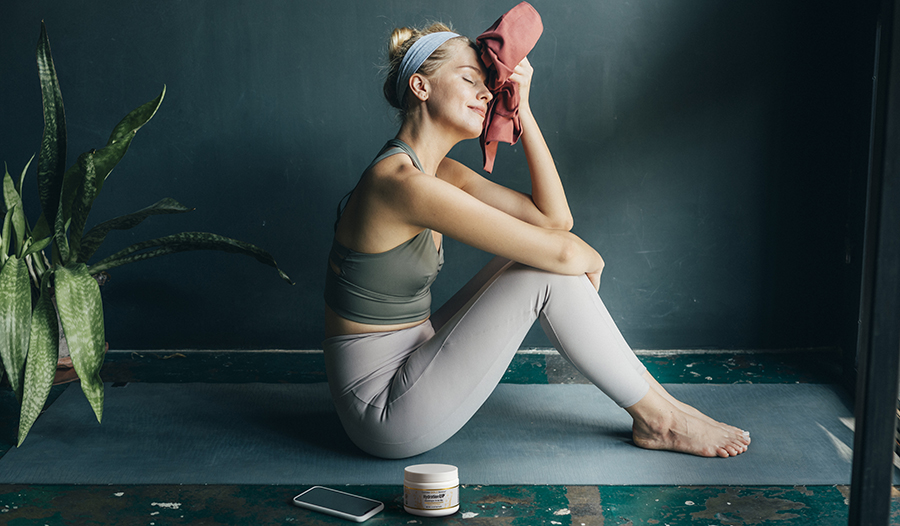Do You Have Heat Exhaustion? Here’s How To Tell and What To Do To Recover

With heatwaves rapidly approaching, it is important to ensure you are adequately hydrated and protecting yourself to avoid heat exhaustion. The body will naturally try to protect itself when exposed to higher temperatures by sweating and bringing more blood to the skin surface, but this can only help for so long.
Without proper precautions, the body’s cooling mechanism can be overwhelmed, and you might suddenly feel the effects of heat exhaustion, dizziness, faintness, nauseous, clammy skin, fast heart rate, headaches, and muscle cramps. If left untreated, heat exhaustion can turn into something more serious.
Thus, as more people start doing activities outdoors during the warmer months, this article will explore how to best protect from heat exhaustion. You will learn how staying hydrated, drinking fluids with plenty of electrolytes, and branched-chain amino acids (BCAAs) can help. We will also discuss how wearing sunscreen appropriately can help prevent heat exhaustion and what type of clothing to wear to best protect yourself from heat exhaustion.
What Are The Stages of Heat Exhaustion?
When you are exposed to heat, there are two ways that your body will try to seek relief. The first is to try to find a cooler place to cool off, and the second is for the body to start its normal physiological response of sweating to maintain normal body temperature. When the body sweats, it brings the blood to the small blood vessels close to the skin.
Since there is more blood closer to the skin, there is less blood returning to the heart, which leads to an increase in the heart rate. With continued heat exposure and a faster heart rate, the brain may not get the blood it needs, which causes the sensation of feeling faint or blacking out.
Cramps can develop because sweat is made of water and electrolytes like sodium and chloride, which drive the release of water from your sweat glands. Electrolytes also drive the normal process of muscles working and other body processes. Thus, as you continue to do activities under the sun without adequate hydration, some of the initial effects you may feel are muscle cramps due to loss of electrolytes and water.
Finally, as you continue being outdoors, whether exercising or just laying under the sun, your body is continuing to fight the effects of the heat. This can lead to your body having a lower volume than normal and not compensating for water loss. With continued sweating, salt depletion, and sun exposure, the body’s compensation will not be able to keep up, leading to symptoms of heat exhaustion.
Symptoms of Heat Exhaustion
- Dizziness and feeling faint
- Nausea
- Clammy or cool skin
- Racing heart rate
- Headaches
- Muscle cramps
Drink Water and Stay Hydrated
Staying hydrated while being under the sun during the summer months is pivotal to preventing heat exhaustion. But not all drinks are created equal. It is important to remember that certain beverages may worsen your dehydration, especially if under the sun, so choose your beverages wisely when partaking in activities under the sun.
Avoid Sugary Drinks and Excessive Caffeine
Avoid fruit juices or sodas if you are exercising and trying to hydrate. These drinks contain excess sugar that may worsen your dehydrated status as the sugar concentration will only increase the number of solutes in your body, leading to your body trying to retain more water. Avoid drinks that contain caffeine, alcohol, and carbonated beverages as they will lead to increased urine production and worsen your dehydrated status.
Try a Sports Drink
If you are under the sun and exercise for longer than 40 minutes, drink a sports drink with 6%-8% carbohydrate content. Sports drinks with an adequate number of electrolytes — sodium, potassium, and chloride — help increase thirst and voluntary fluid intake and offset the amount of fluid lost with sweat. Another important key is to keep your beverages cool, as this will lead to better results of fluid replacements.
Electrolytes are Key
Electrolyte tablets have also been shown to help improve fluid balance during exercise when dissolved in plenty of water. Since sweat is made of water, sodium, and chloride, it is important to ensure you replenish the fluids lost during exercise while under the sun to keep your body hydrated and electrolytes in balance. Maintaining the right amount of electrolyte will also help prevent symptoms of cramps that may occur if hydrating with water alone.
How Much Water to Stay Hydrated?
Water is life. During the summer months, a cool glass of water is not only refreshing but also invigorating. But depending on your needs, age, and level of activity, the amount of water needed to stay hydrated will vary.
Adults not doing any activity while under the sun will have a water requirement of 1ml/kcal of energy expenditure.
This means that if you are spending about 2000 kcal per day, you will need about 2,000 ml of water, which equals about 60 ounces. If you are an active adult exercising under the sun, your water requirement will be 1.5ml/kcal, and with a 2000 kcal expenditure during the day, your water needs are about 3,000 ml per day or 90 ounces per day.
Infants and children are growing, so their energy to water requirement is higher of 1.5ml/kcal, or about 3,000 ml or 90 ounces per day. For the elderly, even though they may be less physically active, they may still have a higher water requirement, especially during the summer.
Therefore, to avoid one of the main symptoms of heat exhaustion, which is low water volume, ensure that you are drinking an adequate amount of water-based on your age and level of activity.
Supplement with BCAAs
Being dehydrated and dealing with heat exhaustion can impair your performance or prevent you from doing your normal activities. Although water is key to staying hydrated, it may not be the best solvent to help immediate recovery when dehydrated, especially under the sun.
Many sports drinks offer water and electrolytes, and carbohydrates to help you stay adequately hydrated and avoid heat exhaustion.
But in a similar fashion, proteins can further increase rehydration when added to a carbohydrate-electrolyte sports drink. Adding protein, primarily in the form of branched-chain amino acids, can help in increasing fluid retention, especially if dehydrated, and even helps with muscle recovery and muscle protein synthesis. Therefore, if you are out in the sun and will be undertaking rigorous activity levels, then consider supplementing your water with BCAAs to help you recover faster, rehydrate better, and avoid the effects of heat exhaustion.
Protect Yourself with Sunscreen
When doing activities under the sun, ensure that you protect yourself with sunscreen with an SPF of 15 or higher 30 minutes before going outdoors. Sunburns affect your body’s ability to cool down and can make you dehydrated. It leads to more water loss through your sweat glands, and although not apparent at first, the effects of heat exhaustion will affect you suddenly if you’re not protected with sunscreen.
When deciding on the type of sunscreen to use, look for sunscreens that say “broad spectrum” or “UVA/UVB protection” on their labels, as these products work best to protect you from harmful rays that may lead to sunburns.
If you must go outdoors, protect yourself from the sun by wearing a wide-brimmed hat, sunglasses, and cool clothes. Wearing loose-fitting, lightweight clothing will help you stay cooler and dry. Conversely, wearing excess clothing or clothing that fits tightly prevents your body from cooling, effectively putting you at risk of heat exhaustion.
Takeaway
Enjoy the warmer months under the sun but stay safe to prevent heat exhaustion. Stay hydrated by drinking plenty of water, and when being active, consider supplementing with sports drinks, BCAAs, and electrolytes. Wear sunscreen and lightweight clothing to stay cool. And above all, take it slow. Getting acclimated will be key to prevent sudden changes to your body and the sudden effects of heat exhaustion.
The Best 5 Supplements For Common Summer Health Issues: Read more.
References:
- Baker LB. Physiology of sweat gland function: The roles of sweating and sweat composition in human health. Temperature (Austin). 2019;6(3):211-259. Published 2019 Jul 17. doi:10.1080/23328940.2019.1632145
- National Research Council (US) Subcommittee on the Tenth Edition of the Recommended Dietary Allowances. Recommended Dietary Allowances: 10th Edition. Washington (DC): National Academies Press (US); 1989. 11, Water and Electrolytes. Available from: https://www.ncbi.nlm.nih.gov/books/NBK234935/
- Pence J, Bloomer RJ. Impact of Nuun Electrolyte Tablets on Fluid Balance in Active Men and Women. Nutrients. 2020;12(10):3030. Published 2020 Oct 2. doi:10.3390/nu12103030
- Székely M, Carletto L, Garami A. The pathophysiology of heat exposure. Temperature (Austin). 2015;2(4):452. Published 2015 May 27. doi:10.1080/23328940.2015.1051207
- Shultz, S. NFHS Handbook Heat Related Illness, Journal of Athletic Training: 35(2).
- Tai CY, Joy JM, Falcone PH, et al. An amino acid-electrolyte beverage may increase cellular rehydration relative to carbohydrate-electrolyte and flavored water beverages. Nutr J. 2014;13:47. Published 2014 May 26. doi:10.1186/1475-2891-13-47
- Tips for Preventing Heat-Related Illness. Centers for Disease Control and Prevention. https://www.cdc.gov/disasters/extremeheat/heattips.html. Published June 19, 2017. Accessed June 14, 2021.
DISCLAIMER:This Wellness Hub does not intend to provide diagnosis...
















































































 Table of Contents
Table of Contents















